The Storyteller’s Voice: Arch Oboler’s Drop Dead! or Everything You Ever Wanted to Know About the Chicken Heart that Devoured the World but Were Afraid to Ask
Drop Dead! front cover
As anyone who reads old comic books can tell you, the cheesy ads in the back pages are often more fun than the actual stories. Warren magazines like Creepy and Eerie were especially good in this regard, aimed as they were at a slightly more adult audience than comics like The Flash or Sub-Mariner were – or if Warren readers weren’t that much more mature, they probably at least had a little more money in their pockets than their slightly younger, allowance-dependent brethren did.
For instance, the last fifteen pages of my copy of Creepy #59 (January, 1974) consist of nothing but ads for such treasures as Planet of the Apes Hobby Kits (“TEN MILLION FANS ASKED FOR IT!”), Vinyl Movie Monster Masks (“NEW! FROM HOLLYWOOD!”), 8MM reels of stop-motion action scenes from Ray Harryhausen’s Jason and the Argonauts and The Seventh Voyage of Sinbad (“A FEAST OF FEARFUL IMAGINATION!”), EC Comics reprints, and pages and pages of paperback books and “Monsterific LP Record Albums!” The latter were mostly a mixed bag of ancient radio shows, “spoken word” renditions of Poe and Bierce stories, movie soundtracks, and those compilations of haunted house sounds that the copywriters assured us would be “great fun for parties!”
The album that always caught my eye (and that’s all it caught – $5.98 wasn’t easy for me to come by in those days) was called Drop Dead!
[Click the images for even more horrifying versions.]
The cover featured a surly-looking skull peering out of the darkness, and the breathless ad copy declared,
When radio was king in the late 30’s and early 40’s, America was scared out of its wits by Arch Oboler’s Lights Out. A sampling of some of the best! Features the legendary tale of the Chicken Heart that devoured Earth! Plus others. Truly terrifying!
Arch Oboler
If I had had the cash, I definitely would have gotten the record; that part about the ravenous chicken heart really put the hook in me. Unfortunately, I never did buy Drop Dead! and so had to forgo finding out just what the hell it was all about… but I always wondered what I had missed.
But now, thanks to THE WONDERS OF THE INTERNET!! I have at last listened to all thirty-seven minutes of Drop Dead! I found it several years ago on one of those “oddball audio” sites, along with other gems like Liberace singing “You Don’t Send Me Flowers,” Orson Welles’ infamous frozen peas commercial, and hours of Judy Garland’s drunken tape-recorder rants, and you don’t even have to make that much effort – the whole of Arch Oboler’s magnum opus can now be found on YouTube or downloaded from Amazon.
State of the art audio
Arch Oboler was indeed one of the giants of radio – the ad in Creepy didn’t lie. Oboler was active in the medium from the early 30’s through the end of World War Two, at which time he began writing and directing movies. He wrote and produced a lot of straight drama (much of which had a polemical edge – Oboler was an early and passionate anti-fascist, back in the days when fascists had panzer divisions instead of Twitter accounts), but his best-remembered radio work is the series Lights Out, a half-hour anthology show featuring stories of horror, suspense, and the supernatural.
Lights Out
Oboler didn’t create Lights Out, but he helmed it from 1936 through 1938 and then revived it for a year in 1942. His post-radio films include Five (1951), an earnest but clumsy attempt to depict the aftermath of a nuclear war, Bwana Devil (1952), one of the first 3-D movies of the fifties (insert joke about flat acting here), and The Twonky (1953), based on the classic science fiction story by Henry Kuttner and C.L. Moore.
Bwana Devil poster 1952
None of Oboler’s movies did very well (with the exception of Bwana Devil with its then-novel gimmick), because none of them are very good. Film didn’t suit him the way radio did, and his ambitions weren’t well served by his talky scripts and miniscule budgets. (Most of Oboler’s movies were independent productions; with the exception of his second film, Bewitched, which he made for MGM, he never worked with a major studio, perhaps because of his notoriously prickly personality.)
Certainly, the best of Arch Oboler is not to be found on the screen, but instead is in the work he did for the “theater of the mind,” as radio has been called, and the last flowering of that talent was Drop Dead! which he produced for Capitol Records in 1962.
The album consists of an “Introduction to Horror,” followed by seven stories. Oboler himself takes care of the “introduction,” and the subsequent stories are handled by a gang of veteran radio actors; at the end of each piece Oboler comes back on to do a lead-in for the next tale.
The two longest stories, “The Dark” and “Chicken Heart” are condensed and re-recorded versions of yarns that were first done years before on Lights Out. (Stephen King heard the Lights Out version of “Chicken Heart” when it was rebroadcast in the 50’s and never forgot it, and neither did Bill Cosby, who built a whole comedy routine around it.) I’m not sure about the others but I assume that most of them originated on radio too. (With only a few exceptions, the only Lights Out shows extant are those from the 1942 revival; almost all of the 1930’s shows have been lost.)
In his “Introduction to Horror,” Oboler, in his ripe radio voice, declares that, “in a horrific time, in a horrible world, I have been asked to try and horrify you – all in fun, of course.” He then instructs his listeners to turn their lights out and then sit with their backs to the speaker while he intones about “something coming up behind you – no, no, don’t turn around,” something that’s “been dead so very long – no, don’t turn around” until finally, just after Arch murmurs about “skeleton hands reaching for your neck…touching your neck…” the exercise ends with a piercing scream.
I have no doubt that it would frighten an exceptionably susceptible six-year old.
Peter Lorre – Accept No Imitations!
Oboler ends the introduction with his lead-in to the first story, “I’m hungry,” which he offers as an example of “Psycho-type” or “sick” horror. “I’m Hungry” is a monologue by a fair-to-middling Peter Lorre impersonator who, as Lorre impersonators tend to do, gets more and more worked up the piece progresses. He invites the listener to sit down with him as he eats his “package dinner” – which turns out to be the head of a “pretty young girl.” It takes some preparation, though; first the head must be cut open (thankfully, I can’t testify whether the sound of the saw cutting through the skull is realistic or not, but it is effective in an “ewww!” kind of way) so that the narrator can get to his meal, which beings the story to its climax: “I know what you’re thinking – you think I am psychotic. I’m not psychotic! I’m just hungry! I like to eat brains.”
As you can see (or hear, rather), “I’m Hungry” isn’t really a story at all; it’s just a vignette or anecdote, which is true of most of the tracks on Drop Dead!
The next piece, “Taking Papa Home,” is, according to Oboler, the kind of horror “that, after it starts, pretty soon you just can’t stand it and you want it to stop but it doesn’t stop and when it stops, you’re sorry it had stopped.” The back of the album cover is clearer and more succinct – “Papa” is “suspense-type horror.” A wife is driving her totally sloshed husband home from his retirement dinner, and while he incoherently babbles and sings snatches of songs, she glowingly anticipates their new life together (most of which she’ll spend hiding the cooking sherry, presumably). While going over the railroad tracks the car stalls out, and a train whistle is immediately heard. Of course, Papa has completely passed out by this time, and he’s too heavy for his wife to budge, and all the while her panic increases as the train gets nearer… and nearer… and…
Have a nice retirement
Needless to say, “Taking Papa Home” ends with a real bang.
The third tale is the album’s longest, at just over eight minutes, and is an example of “supernormal” horror. “The Dark” begins with a doctor and an ambulance driver responding to a call from an isolated house. When they arrive, they find nothing but an insane old woman who never speaks a word, but only cackles maniacally. Exploring the house, they open a door and find “a man… and he’s been turned inside out.” In case you have trouble envisioning it, “the skin is the inside, and the raw flesh is the outside; organs hanging…” And the greatest horror is that the man is still alive.
The driver, Sam, wants to flee, but the doctor insists on further exploration; he must find the why behind this impossible event. Opening another door, they discover a room with no floor, only a shapeless, seething darkness where the floor should be. The mad old woman rushes in and, before the pair can do anything to stop it, the darkness reaches out, takes her, and… turns her inside out. (At this point it sounds like something – I would guess a rubber glove – is indeed slowly being pulled inside out.)
Inside out
Sam faints. The doctor refuses to leave his friend behind and frantically tries to rouse him and, failing that, move him, as the cold and slimy darkness inexorably stretches forth once more, and…
They had to use another rubber glove to wrap this one up. If the doc had listened to “Driving Papa Home,” he would have known to get out while the getting was good.
Oboler now returns to set up the next piece, which is an example of the “humorous-type of horror.” Humorous or not, “A Day at the Dentist’s” is one of Drop Dead’s high points. A patient arrives at a dentist’s office for emergency treatment. After hearing that the patient’s name is Fred Housman, the dentist abruptly dismisses his assistant, telling her to go home and lock the outer door. “Mr. Housman will be my last patient.” During the obligatory dentist-patient chit chat, we learn that the dentist is new to this office: “I used to come here to Dr. Charles; I didn’t know that you’d taken over,” the toothache-suffering Housman says. After getting settled in the chair and describing his problem, the patient nervously seeks a bit of reassurance. “You’re sure it’s painless, Doctor… one thing I sure can’t stand is a little pain. You know – drilling and things like that?” “Oh no – no pain,” the dentist replies in an eerily calm voice. He then proceeds to strap his surprised patient into the chair – “In order to keep this painless, there must be absolutely no movement.”
Once Housman is immobilized, the appointment begins to take an odd turn. “There you are,” the dentist says. “Snug as a bug in a rug. That’s a curious thing to call you, isn’t it? You’re no bug – you’re the lover type, aren’t you?” When the flustered Housman asks, “What the hell is this?” the dentist ask if he remembers Mary Ellson. “Surely you haven’t forgotten Mary, lover boy? What you did to her was very special, wasn’t it? Worth remembering… worth talking about… worth slobbering over.”
The Horror! The Horror!
Mary was the dentist’s wife, you see, and as Housman struggles to get free, all is made clear. “No, you won’t break those straps. They’ve been waiting just for you. That’s why I bought out Dr. Charles’ practice – because I knew that sooner or later you’d come back to him: the painless dentist. Now you’re here; now you’re here.” And as the frantic Houseman begins to whimper and blubber and plead, the dentist fires up the drill. What is he going to do? “Nothing important; just going to drill a little hole to let out some of lover boy.” Perhaps the most appalling thing is that we’re kept in the dark as to exactly where this hole is going to be drilled. Oboler wisely leaves that to our own evil imaginations.
Drop Dead! (back cover)
The back of the cover lists the album’s cast members but doesn’t assign them to any of the specific pieces. I wish it did – I would love to know who the principals are in “A Day at the Dentist’s,” because they do a brilliant job, and the tale is indeed both extremely nasty and very funny, chiefly because of the voice acting, especially the indescribably dark and twisted nuances that the actor playing the dentist imparts to the simple phrase, “lover boy.”
The next piece, “The Posse,” is the album’s shortest and slightest, consisting of nothing but a cowboy’s coarse jesting before he lynches a (presumed) cattle rustler. This is “T.V. type horror,” a phrase which would probably puzzle today’s listeners but which makes a bit more sense when you realize that from the fifties through most of the sixties, no genre was more dominant on the tube than the western.
Leaving the unfortunate rustler choking and kicking, we come at last to “science-fiction type” horror and the story whose title so intrigued me all those years ago – “Chicken Heart.”
Chicken Heart
The story (and of all of Drop Dead’s tracks, “Chicken Heart” comes the closest to being a fully developed story and not just a sick joke) begins in fourth gear, as a frantic reporter calls his editor with the “greatest news story of the generation.” Breathlessly, the newsman tells his incredulous boss that “the thing’s still growing… no, Chief, I tell you the truth – the corridor’s choked with living, crawling flesh!” In the space of an hour, something has grown so large as to take over an entire building. We leave the reporter trying to convince his editor that he’s not drunk to listen in as Doctor Albert, the scientist responsible for the crisis, in his turn tries to persuade the authorities to take swift action. “You’ve got to believe me! I tell you, the only hope is to burn the building to the ground – at once!”
But no one will listen, despite the horrific picture the Doctor paints:
This tissue is doubling in size every hour. Do you know what that means? In another hour, it will be twice the size it is now, and long before that it will break open the building with the force of its pressure! And then it will be free in the street… and then those tentacles of protoplasm stretching out to feed on anything they can reach…
Even as Albert vainly struggles to explain the threat, the walls of the building explode outward, and the beat of a heart can be heard, muted at first, but steadily growing stronger. “I tried to warn them,” the despairing scientist mutters. “Now it is too late. The heart is free.”
Soon after, at a chaotic press conference, Doctor Albert finally explains the terrifying situation. “That great, ever-growing mass of flesh… it is – or it was – a chicken heart.” He can give no reason why the heart is experiencing this incredible, rapid growth, but he is crystal clear about what will happen if it isn’t stopped – and quickly.
If it is now one block in size, within thirty hours that cannibal flesh will have increased in size to one square block to the thirtieth power. In thirty hours every inch of this whole city will be crushed under that moving flesh. Within sixty hours it will have covered the entire state; within two weeks the entire United States!
For some inexplicable reason, the authorities use fire hoses to try to drown the heart. Predictably, the result is complete failure. The doctor is not surprised. “The fools – what good is water? I told them. The only hope is artillery.” By now, however, the heart has grown too large to be stopped that way. “It grows too quickly – the flesh is already engulfing the guns. They came too late.”
“Chicken Heart” concludes with Doctor Albert and a pilot named Lewis flying west in a small plane, trying to escape the ravenous protoplasm, which has now grown to cover the entire East Coast. By now the scientist is able to view things with a certain detachment. “Look at it down there – a grey blanket of evil covering everything. See how the roads are black with men and women and their children running for their lives. See how the protoplasmic grey reaches out and engulfs them…” Ultimately, Doctor Albert is even able to find a measure of grim pleasure in the grotesque irony of the situation.
This is reality, Lewis. The end has come for humanity, not in the red of atomic fusion, not in the glory of interstellar combustion, not in the peace of white, cold, silence, but in that – that creeping, grasping flesh below us. It is a joke, eh, Lewis? A great joke, the joke of the cosmos! The end of mankind… because of a chicken heart.
And as the plane runs out of gas and spirals into the enormous, pulsating mass, Lewis’ shrieks are subsumed into the beating of the heart.
Drop Dead! has its ups and downs, but “Chicken Heart” was worth waiting four decades for. It is a miniscule masterpiece of over-the-top absurdity, a loony black and white, late show, science fiction schlock classic condensed into seven minutes and seventeen seconds. Only a truly twisted mind could have come up with it, and it’s executed with a poise and professionalism that only makes it all the more disconcerting. How they managed to record the thing without collapsing with laughter, I’ll never know.
After “Chicken Heart,” the final track on Drop Dead! can’t help but be an anticlimax, even though Oboler tells us that “The Laughing Man” is “the ultimate in horror.” Twenty thousand years in the future, a man (who is “the greatest living scholar of the history of the old world”) guffaws as he relates how a stranger gave him a book that purports to be the “first written record ever to be found” of the previous, long-vanished civilization. The book relates how the people of that time battled each other over land (“Did you ever hear such nonsense?!”) and over race (“What a fraud, that book!”) and how those who preached peace were honored but ignored but those who preached war easily induced men to go out and kill “with bright music playing – music, I tell you!” By the end, the scholar can hardly speak for his laughter, for who could take such a joke, such a “humbug history” seriously?
“The Laughing Man” ends with a clash of cymbals, and unless you’ve set your turntable to repeat, Arch Oboler’s experiment in horror is finished.
A better investment
As I said, $5.98 was a lot of money to me back in the days when I first laid eyes on the advertisement for Drop Dead! If I had managed to scrape the cash together and had sent away for the record, how pleased would I have been once I had received the album and played it? I don’t know. I suspect I would have been a little cheesed, and would have thought about all the issues of Creem or the Ace Frehley poster I could have spent the money on. (Talk about the laughable relics of a vanished civilization!)
All these years later, though, I’m glad I finally heard it. Horrifying it’s not, but on its best tracks, Drop Dead! conjures up more than a few echoes of the energy and inventiveness and high spirits that made radio great. And a chicken heart. Thump thump.
Eyaaahhhh!
Thomas Parker is a native Southern Californian and a lifelong science fiction, fantasy, and mystery fan. When not corrupting the next generation as a fourth grade teacher, he collects Roger Corman movies, Silver Age comic books, Ace doubles, and despairing looks from his wife. His last article for us was a review of Tim Kirk’s 1975 Tolkien Calendar.
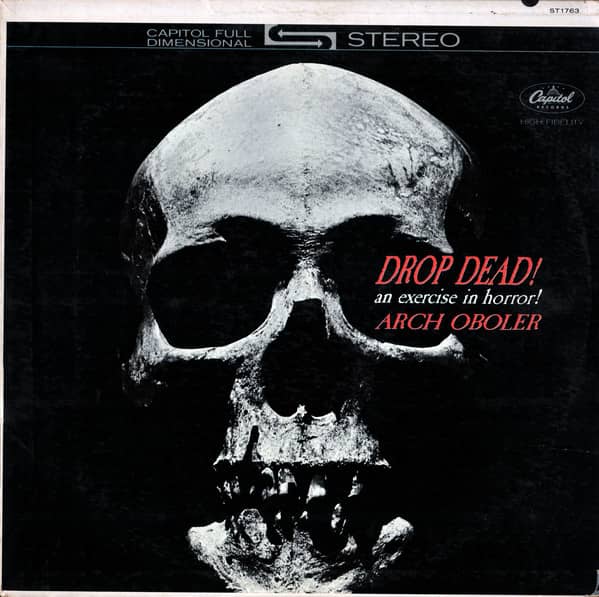
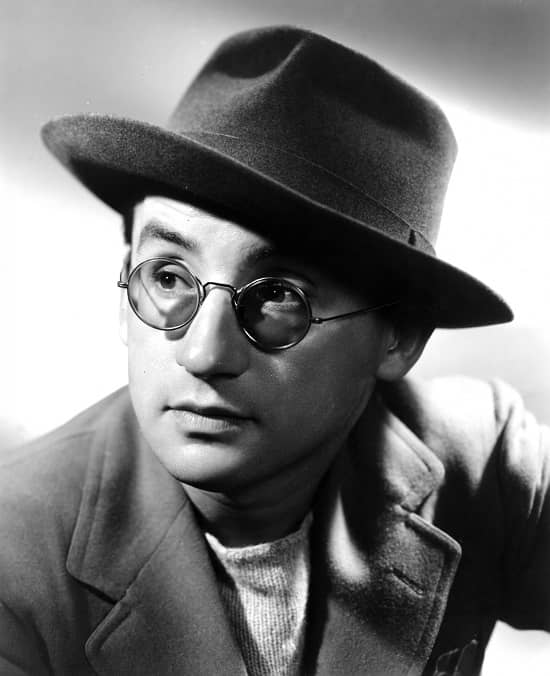
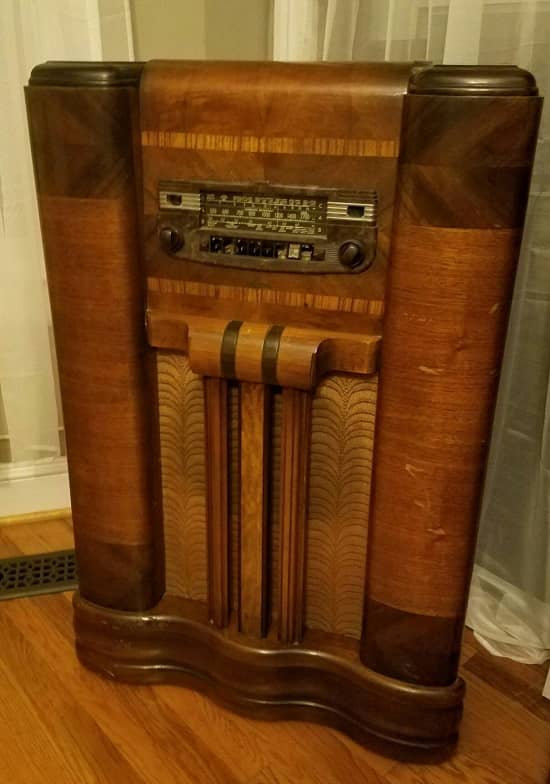
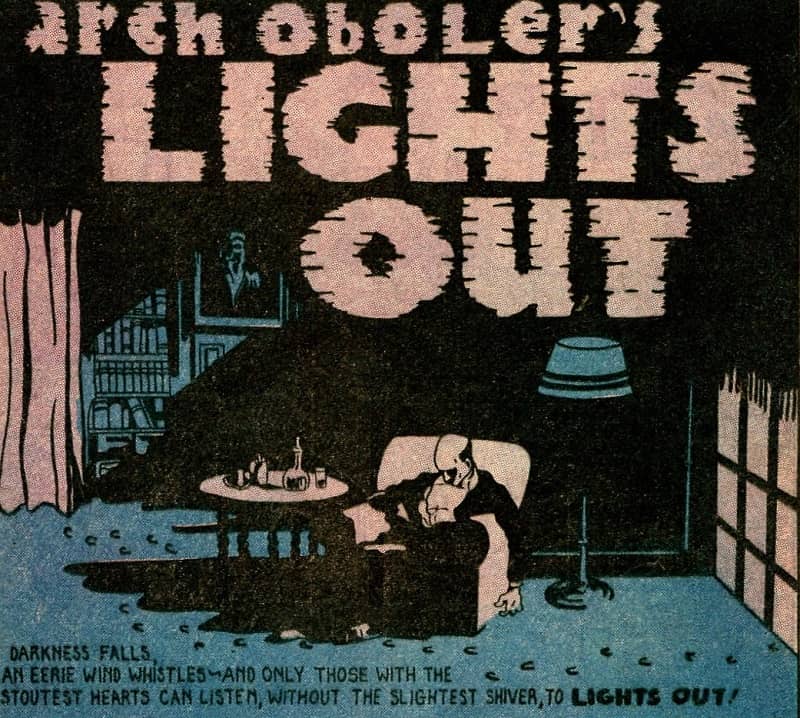
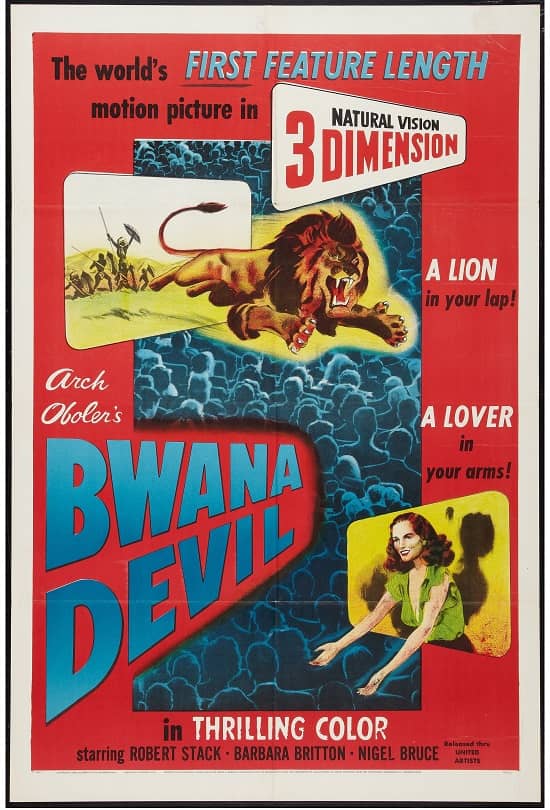
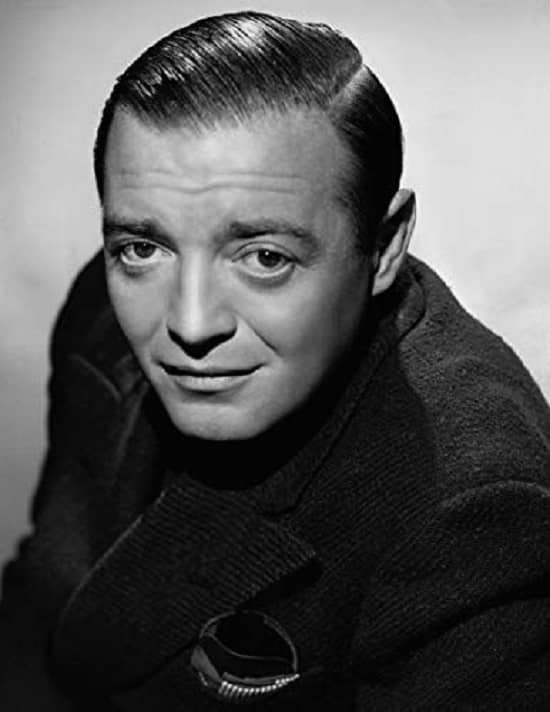



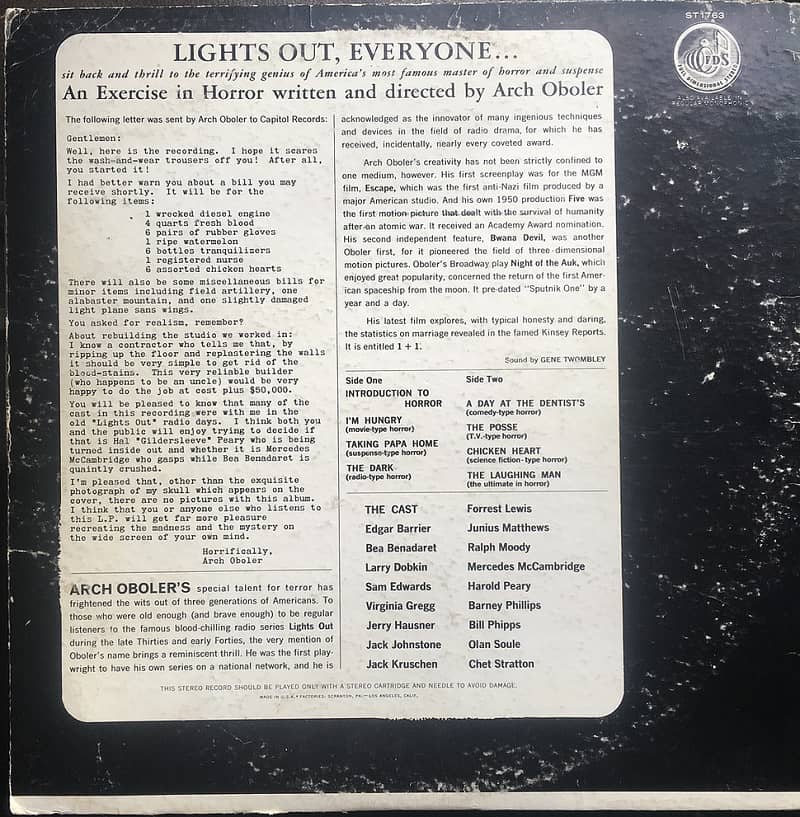
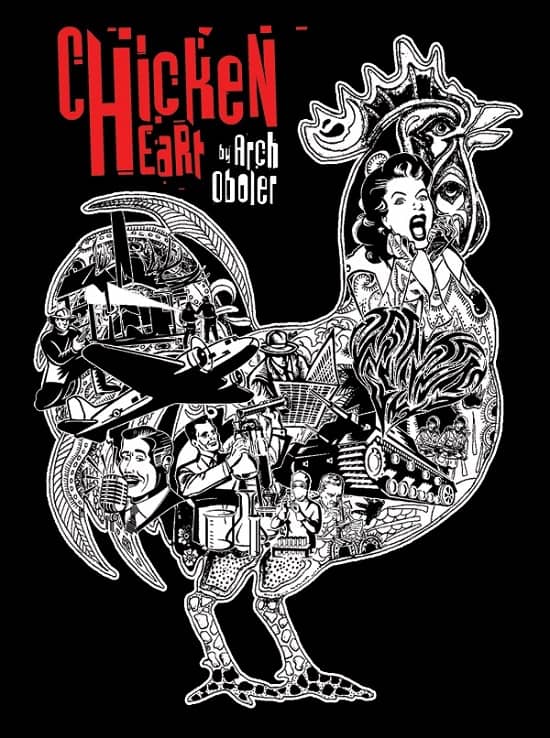
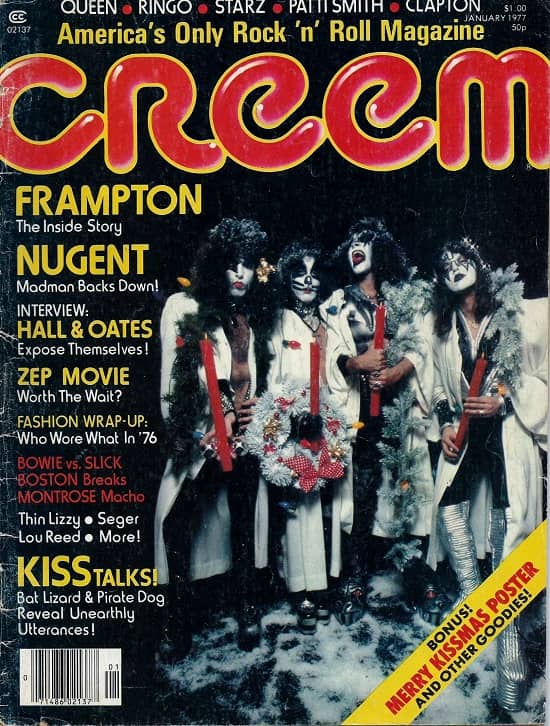
Recordings like Drop Dead! were one of my greatest finds at my local public library. I mean, sure, music came on records. But stories? Like Leiningen versus the Ants with William Conrad narrating? Wow! Caedmon Records became my favorite publisher for years.
And there is no way I would not listen to “Chicken Heart”, and no way I would not hear Mr. Cosby providing his own narration. Oh, if only he had not turned to the Dark Side of the Force!
Eugene, I heard the Cosby routine about his brother and him listening to Chicken Heart before I ever knew that there was an Oboler original. The premise was so surreally goofy that I thought Cosby had to have invented the whole thing himself.
Oboler did write some really great, entertaining episodes of “Light’s Out”. If you get a chance, I recommend “Poltergeist” and “Valse Triste” for a listen. His anti-fascist/Nazi episodes with their predictable, heavy-handed plots, weren’t too entertaining, though.
Somebody here at Black Gate should do an article about the J. R. R. Tolkien record issued by Caedmon around 1969, Poems and Songs from Middle-earth, with Tolkien reading several of his poems, one of them in Elvish, which, without trying, I memorized just from hearing it so may times. The cover design by Pauline Baynes was and is one of my favorite pieces of Tolkienian art, although it was actually designed for the first paperback edition of LotR issued by Allen and Unwin — which I didn’t know when I got the LP.
Oh God! I had this on tape as a kid. We had a rinky dinky PBS station at the top of the highest hill in Licking County and they were pretty much running their own show. anyways, they ran lots of old Serials and even played some OTR records on air. I was so freaked out by “the Dark” that I called the station manager ( I think his name was john Hall. He was also host to several shows) and received permission to go up and record the entire record on my reel to reel tape player that I had received for my 11th birthday. This was 49 years ago. And on a side note, even though Bill Cosby has been exposed as a human turd, he did do a hysterical take on the Chicken Heart and even did it on the old Fat Albert show.
https://en.wikipedia.org/wiki/WGSF_(TV)
https://www.youtube.com/watch?v=QfTe6SoFM-Y
My music teacher in freshman year of high school had been a classmate of Bill Cosby at Temple University. One hot May afternoon, he played Cosby’s version of “Chicken Heart” for us and then patiently taught us how to make the heart beat sound ourselves.
The other teachers HATED him.
For all his flaws, Oboler was a genius. Yes, he could be longwinded and preachy, but some of Rod Serling’s horror was overwritten too. Arch certainly knew how to promote himself, which stood him in good stead when he sold his 3-D film Bwana Devil to United Artists for a fortune in 1952 dollars. With time, other horror practitioners have learned how to use the “less is more” approach to scaring us, but there wouldn’t have been an audience for grisly thrills without innovators like Arch Oboler and Willis Cooper, who created Lights Out and another remarkable radio spook show, Quiet Please. Drop Dead scared me to death as a child, but today I admire its high craftsmanship.